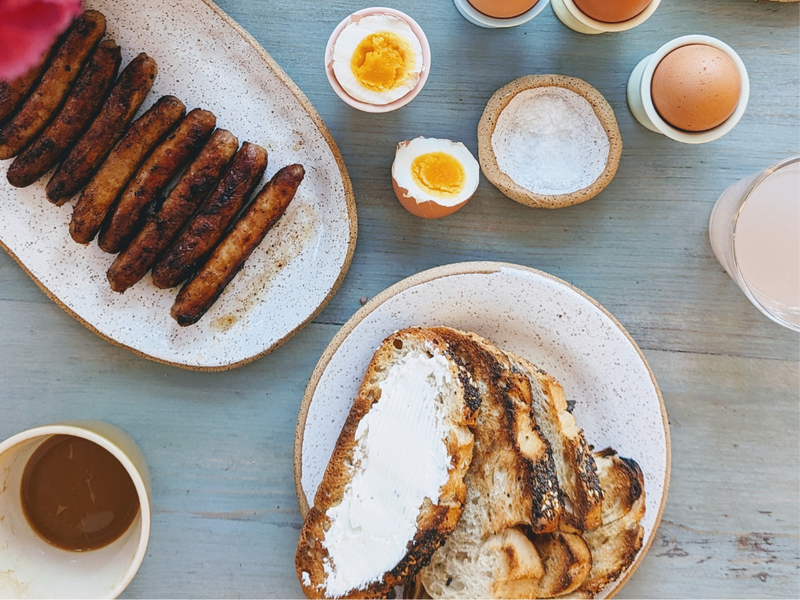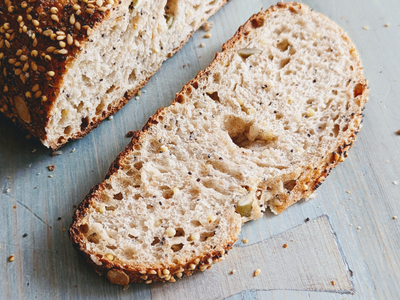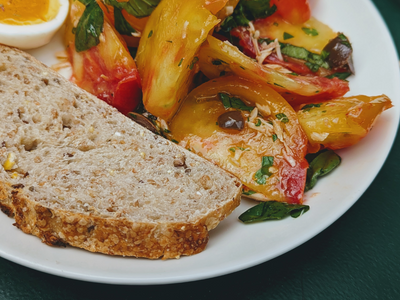By Dr. Jorge, Ph.D.
Bread and butter - a classic pairing that never seems to get old and tastes delicious no matter the time of day. Is this one of your go-to snacks? If so, read on to learn more about the infamous bread and butter combo and whether this snack aligns in with your health goals.
Why is buttered bread so good?
While there is no scientific reason as to why bread and butter taste so good together, everyone seems to agree that eating butter with bread is one of life’s greatest culinary experiences. Some argue that adding butter to bread before toasting enhances the flavor of this already delicious pairing. This method allows the bread to stay crisp while butter melts into the entire slice of bread. In contrast, slathering butter on top of warm toast can result in the bread becoming soggy. Of course, this is all up to personal preference and makes for a tasty snack either way!
Is eating bread with butter healthy? Is buttered bread good for you?
Eating bread with butter can be healthy when enjoyed in moderation; you can also increase the nutritional profile of this favorite snack by choosing your bread and butter wisely. For example, bread made from whole grains or whole wheat is a healthier choice compared to white bread which is made from refined grains. Sourdough bread and rye bread are two other nutritious bread options. Butter can add excessive sodium and fat to your diet, so you should make sure you’re aware of both the fat and the sodium content as well as the serving size of butter you are adding to your bread. Although it may be assumed that butter is not good for one’s health, buttered bread can be good for you when incorporated into a balanced diet. Butter is rich in calcium and has been shown to have certain health benefits, including lower risks of cancer and helping people lose or maintain weight.
Is bread and butter a healthy breakfast?
Bread and butter can be a healthy breakfast depending on the type of bread and butter as well as what you choose to pair this classic combination with. Bread made from 100% whole grains, sourdough bread, and rye bread are going to be rich in nutrients and will help you feel full for longer. You can try unsalted butter instead of salted butter to reduce your sodium intake. You can also choose grass-fed butter which has been shown to have increased health benefits and reduced health risks compared to regular butter. If you’re having two slices of bread for breakfast, try swapping butter on one of the slices with peanut butter or bananas to further enhance the nutritional profile of your bread and butter breakfast.
Can you eat bread with butter while trying to lose weight? Can you eat bread and butter on a diet?
Yes, you absolutely can eat bread with butter while achieving your weight loss goals. The key to losing weight is to remain in a caloric deficit or to consume fewer calories than you burn in a day. One slice of white bread contains about 70 calories and a single serving of salted butter (or one tablespoon) contains about 100 calories, meaning that one slice of bread with butter contains about 170 calories. Two slices of bread with one serving of butter on each slice of bread brings the total to 340 calories. Even though there aren't too many calories in this meal alone, it probably won't fill you up for very long. To continue enjoying bread with butter while staying full for longer, you can choose a whole wheat or whole grain bread option. Studies have shown that consuming a diet rich in whole grains can help you to lose belly fat and will leave you feeling fuller, making it easier to consume fewer calories. Bread and butter can fit into any diet so long as you choose varieties that fit in with your health goals.
Is bread and butter good for weight gain?
Bread and butter can promote weight gain depending on how often you eat this snack and the serving size. In contrast to losing weight, gaining weight will require you to consume more calories than you burn. This can be done by eating any food in excess, including bread and butter. Increasing the amount of bread, butter, or both in your diet and the frequency with which you eat them will cause weight gain.
Is bread with butter ok for diabetics?
Consuming bread with butter is okay for diabetics but should be enjoyed in moderation. Bread that is lower in carbohydrates and higher in fiber is the best choice for diabetics as fiber eaten in conjunction with carbohydrates helps to prevent blood sugar spikes. For diabetics, buttery or olive oil spreads work well in place of regular butter because they taste just as good but typically have less saturated fat.
What is the best bread to eat with butter?
The best bread to eat with butter is your favorite type of bread! While the tastiest bread to pair with butter is completely up to personal preference, many tend to enjoy a slice of baguette bread with a spread of butter. Ciabatta bread, sourdough bread, and rye bread are some other fan favorites when it comes to choosing a bread type to enjoy with butter.
Where can I buy the best fresh bread and butter online?
At Wildgrain, we specialize in making high-quality, fresh baked goods that are delivered directly to your door. Wildgrain is the first bake-from-frozen delivery subscription service for breads, pastries, and fresh pastas. Some of our popular breads include sourdough whole wheat loaf, and everything sourdough bread, as well as fresh churned butter. Learn more about Wildgrain and our artisanal baking and cooking methods.
About the Author
This content is for informational use only and does not replace professional nutrition and/or medical advice, diagnosis or treatment. It is not a substitute for and should not be relied upon for specific nutrition and/or medical recommendations. Please talk with your doctor about any questions or concerns.




